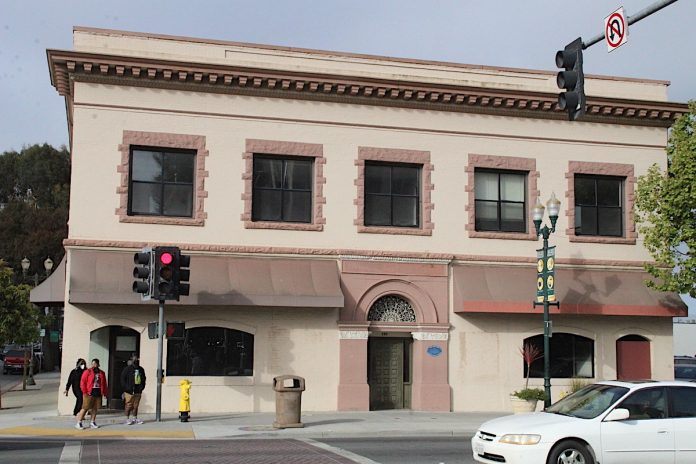WATSONVILLE—The city of Watsonville is expected to resume negotiations with the Pajaro Valley Arts (PVA) Council for the sale of the Porter Building after no affordable housing developers showed serious interest in the historic landmark.
Watsonville and PVA earlier this year had begun early discussions around the vacant city-owned building before the municipality became aware of Assembly Bill 1486, also known as the Surplus Land Act. That bill requires jurisdictions to make all “surplus” properties—defined broadly as land that is not currently in use by cities, counties and districts—to be made available to affordable housing developers before they can be sold.
Because of that, negotiations were paused for 60 days—the time required by AB 1486, which went into effect on Jan. 1, 2020—to allow potential developers to step forward. That waiting period expired Tuesday without a serious inquiry from a developer, Assistant City Manager Tamara Vides said.
“I have received a few inquiries but nothing that requires that we engage in negotiations,” she said. “So we will resume the preparations of our exclusive rights negotiations with the party that is interested at this time.”
The next phase of negotiations, Vides said, could take anywhere from three to five months. Over that time, the city, as ordered by the City Council, will work with PVA to develop a plan, and make sure the small nonprofit understands the scope of what is expected to be a multi-million dollar rebuild of the 117-year-old building, Vides said.
PV Arts in plans presented to the City Council in late 2020 had hoped to turn the Porter Building into a haven for artists by creating gallery exhibits, art retail space and a multipurpose room for performances, meetings, events, workshops and additional special exhibits. Several classrooms for seniors and young people and artists’ studios were also in their plans.
PV Arts Treasurer Judy Stabile told the City Council then that the nonprofit would use the building to expand its longstanding art shows, classes and retail opportunities currently found at its Sudden Street location—a spot it rents from the city at almost no cost.
“I know that PV Arts is very, very committed to this idea and they would like to make every effort to make it happen,” Vides said.
Negotiations between the city and PVA picked up after Dan Pulcrano, the owner and CEO of this publication, put a pause on his proposal for the building. Pulcrano in an editorial in the Pajaronian said he made the decision because he did not want to halt PV Arts’ plans of expanding arts in Watsonville and sow “unnecessary division in the community.”
Pulcrano, also the CEO and owner of the Santa Cruz Good Times and San Jose’s Metro Silicon Valley, planned to create a casual dining Italian restaurant with well-known restaurateur Joe Cirone, emphasizing locally sourced ingredients, and a wine bar and food market highlighting Santa Cruz Mountains vineyards, Pajaro Valley farms and artisanal producers. The project also called for a “boutique” micro-hotel and a “creative space” for community institutions, as well as offices for the Pajaronian.
The original request for proposals said the city wanted ideas that would maximize the building’s potential by bringing an entertainment or retail-related business to the first floor.
The building was nearly sold in 2015 after Ceiba College Prep Academy moved out, but a deal with Walnut Creek’s Novin Development fell through.
It has sat empty since.
The building served as the post office until 1913 and has also served as a dentist office and an army surplus store.
It was one of the few historic buildings in Watsonville’s downtown that survived the 1989 Loma Prieta Earthquake with minimal damage.







